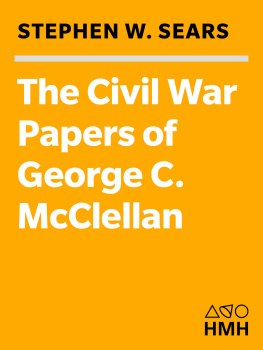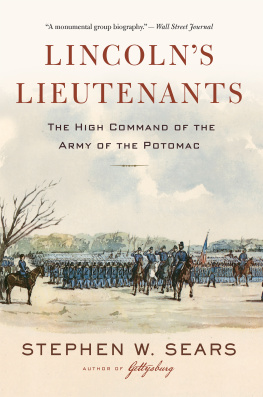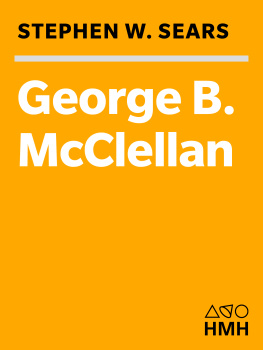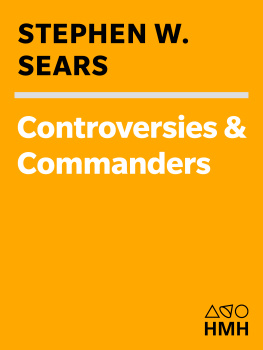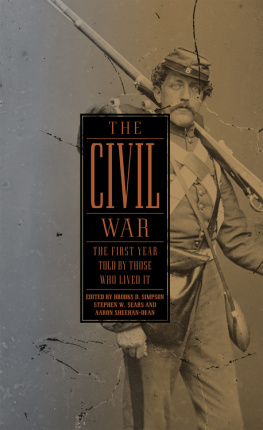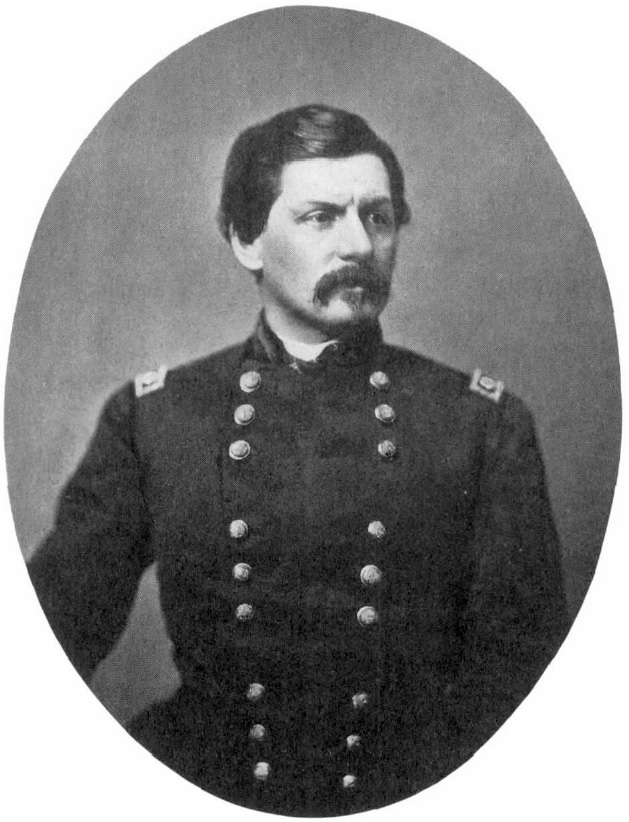M AJOR G ENERAL G EORGE B. M C C LELLAN ,
photographed by Mathew Brady
HARVARD COLLEGE LIBRARY
Copyright 1989 by Stephen W. Sears
ALL RIGHTS RESERVED
For information about permission to reproduce selections from this book, write to or to Permissions, Houghton Mifflin Harcourt Publishing Company, 3 Park Avenue, 19th Floor, New York, New York 10016.
www.hmhco.com
The Library of Congress has cataloged the print edition as follows:
McClellan, George Brinton, 18261885.
[Correspondence. Selections]
The Civil War Papers of George B. McClellan : selected
correspondence, 18601865 / edited by Stephen W. Sears,
p. cm.
Includes indexes.
ISBN 0-89919-337-4
1. McClellan, George Brinton, 18261885Correspondence. 2. United StatesHistoryCivil War, 18611865Campaigns. 3. GeneralsUnited StatesCorrespondence. I. Sears, Stephen W. II. Title.
E467.1.M2A4 1989 88-29447
973.7'82'0924dc19 CIP
e ISBN 978-0-547-97117-9
v2.0518
Introduction
T HIS COLLECTION of General George B. McClellans Civil War correspondence presents him in a wide variety of wartime rolesarmy commander, theater commander, general-in-chief, grand strategist, battlefield tactician, military executive, political partisan, presidential candidate. Among Union commanders, only Grant and Halleck matched McClellans range of military positions ; overall, his combination of roles made him unique in the war years.
General McClellan served on active duty for something over eighteen months, from late April 1861 to early November 1862. He was in the upper echelons of command from the very beginning. When he was appointed major general of volunteers on April 23, 1861, and then major general in the regular army on May 14, it ranked him second only to Winfield Scott, the general-in-chief. After directing operations in the western theater as head of the Department of the Ohio and campaigning in western Virginia, he was summoned to Washington following the Bull Run debacle to organize and train the Army of the Potomacthe task he always regarded as his greatest wartime accomplishment. During the same period, in the winter of 18611862, he served for four months as general-in-chief of all the Union armies. His Peninsula campaign in the spring and summer of 1862 was one of the major operations of the war. In the Second Bull Run campaign his role was peripheral but highly controversial. His operations in Maryland that fall witnessed, at Antietam, what is still the bloodiest single day of battle in the nations history. When he was relieved of command seven weeks after Antietam, he was the armys senior general.
Until the emergence of Grant and Sherman, McClellan was unqestion-ably the best-known military figure in the North, and he stands alongside those two generals in the importance of his impact on the war. No one came close to matching him as a center of controversy. In the election of 1864 some 1.8 million of his fellow citizens voted for him as the Democratic nominee for president, and if on Election Day he lost to Lincoln by a full ten percentage points, his vote count nonetheless represented a sizable constituency. By any measure, George McClellan was a figure to be reckoned with in the Civil War years.
This first collection of his wartime papers includes a surprising number of previously unpublished military letters and dispatches, many of them of considerable historical importance. Very little of his personal correspondence has been published, or published as he wrote it, until now. Of the 813 pieces of correspondence selected for this volume, 260, nearly a third, have not been in print before, and another 192his letters to his wifeappear here uncensored for the first time.
Although McClellan military correspondence may be found in greater or lesser amounts scattered through some twenty volumes of the Official Records of the Civil War armiesand in volumes of the Official Records of the navies as wellthe compilers of these war records had by no means the entire body of McClellans military documents from which to choose. Hundreds of his dispatches remained unseen in his personal papers.
When he took final leave of the Army of the Potomac at Warrenton Junction, Virginia, on November 11, 1862, McClellan carried away with him virtually all the armys headquarters papers. The new commander, Ambrose Burnside, can have inherited little more than current paperwork. That winter and into the spring of 1863 McClellan and his staff, stationed in New York City, worked through this mass of records in the course of preparing the final report of his tenure as commander of the Potomac army. This book-length work, when it was published in 1864, contained page after page of the generals letters and telegrams selected to documentand to rationalizehis actions. As delivered to the War Department, the manuscript of McClellans Report on the Organization of the Army of the Potomac, and of Its Campaigns in Virginia and Maryland was accompanied by numerous maps and 263 reports by subordinates, but nothing more of the armys records was returned to the government.
McClellan regarded what remained in his handscopies of his dispatches and dispatches received from others, unofficial and informal communications to and from him, drafts and memorandums and planning papers, intra-army battlefield messages and communications of every kind and in great numberas his property; only the contents of his Report and what related directly to it (such as the reports of his subordinates) were by his description public documents belonging to the government. On one occasion, at the request of the War Records Office, he supplied copies of a few papers bearing on his western Virginia cam-paign, but on the whole he contributed almost nothing to the Official Records project in the postwar years. In 1896, eleven years after McClellans death, his son, New York congressman George B. McClellan, Jr., loaned a few of his fathers dispatch books to the War Records compilers, and the considerable number of dispatches they utilized from them in the supplementary volumes of the Official Records suggests how much more complete the official historical record of the war for the years 1861 and 1862 might have been had the McClellan Papers in their entirety been made available from the first.
In selecting the contents of this volume, only McClellans letters, telegrams, memorandums, and certain documents such as proclamations and addresses to his army have been considered, and only what is signed or unmistakably written by him. Correspondence signed by others by command of General McClellan is not included unless found in manuscript in his hand. Due to their length, his official campaign reports have also been excluded; they are few in number in any event, and readily available in the Official Records or, in the case of his Report, in separate book form as well. Other types of material excluded are matters of everyday military routine, orders and endorsements of little significance, multiple drafts, and, in private correspondence, perfunctory acknowledgments. To avoid repetition, when McClellan wrote several accounts of an event, the most complete and intrinsically valuable has been selected. When all else was equal, the unpublished was given precedence over the published.
All of McClellans strategic papers and campaign plans are included here, as well as everything of significance bearing on his tactical decisions. In matters of military administration, as many representative examples of his actions as possible have been chosen. Virtually everything he wrote, officially and privately, bearing on the issues, policies, and politics of the war, and his roles in it, has been included. The purpose is to present, as nearly as the material allows, a comprehensive narration of events as General McClellan wrote it at the time.

